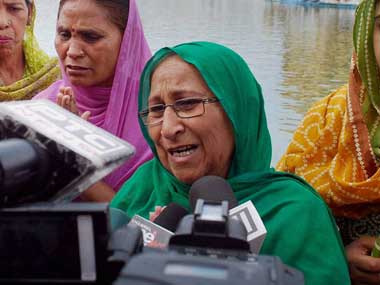It is impossible not to feel for Sarabjit Singh's family, especially for Dalbir Kaur, who has seen her brother for only the third time in two decades.
 |
| Dalbir Kaur has spearheaded the campaign to free her brother for decades. PTI |
She is an inconvenient figure who shadows every big India-Pakistan bilateral meeting, keeping a small spotlight on Sarabjit Singh, even as leaders and officials discuss the convoluted composite dialogue and vacillating peace process. Despite heavy security and the media crush, Dalbir Kaur, stands her ground, waiting to speak to whichever Pakistani dignitary is visiting, and makes her request. Often, as she did when Pakistan's former Interior Minister Rehman Malik came to Delhi, she bursts into tears, an indicator of the trauma she still feels 23 years after her brother first went missing.
It is easy to dismiss Dalbir Kaur's pleas. After all, at the same time that India refuses to normalize relations with Pakistan until it acts on terror, and curbs the ISI's covert activities, its seems incongruous, even hypocritical to bring up the case of Sarabjit Singh, a man who has been convicted for planting bombs that killed 14 people, allegedly at the behest of the R&AW. In pushing Sarabjit's case beyond a point, India would lose a bargaining advantage on other issues, like prosecuting the 26/11 masterminds or resolving complex issues like Siachen, water disputes, and trade.
For Pakistan's government, releasing Sarabjit would open it to a massive attack from extremist groups who want him to hang just as Ajmal Kasab and Afzal Guru did. On past occasions when the Pakistani government has shown mercy, releasing Kashmir Singh, Gopal Dass, Surjeet Singh and others on humanitarian grounds, it has backfired: All of them have admitted publicly on return that they were spies for R&AW and the Indian Army.
A glimpse of just how difficult it would be to release Sarabjit was had when President Zardari's spokesperson reportedly announced the release of Sarabjit Singh in June 2012. Within minutes Pakistani channels erupted in outrage, and the radical right led by Jamaat-ud-Dawa Chief Hafiz Saeed issued threatening statements condemning the move. Five hours later, under pressure, or otherwise, the President's office clarified it had meant Surjeet, not Sarabjit Singh would be released.
The case for Sarabjit Singh has, however, been made at the highest levels....in large part due to the constant efforts of Dalbir Kaur, and her inevitable presence on television channels whenever India and Pakistan meet. Successive Indian Prime Ministers and Foreign Ministers have called for his release in their meetings with the Pakistani leadership. After all, he has served 22 years on death row, clearly had a faulty trial with a poor, even absentee legal defence, maintains that he is a victim of mistaken identity, and wasn't even present in Pakistan when the bombs went off (he was arrested on a visit 3 months later). In his comprehensive report, Praveen Swami makes the case that even if Sarabjit Singh is guilty of being a spy (as he said in his televised confessional statement), he and others like him must be acknowledged and owned by the Indian government, and the government must negotiate forcefully on his behalf.
In 2008, when President Zardari announced a moratorium on all executions, and then in 2012, when India released Pakistani murder convict Dr. Salim Chishti, it seemed as if the PPP government would relent and return Sarabjit. Some even speculate that the murderous attack on him by fellow prisoners was in fact a conspiracy involving extremist groups and their sympathizers within the establishment who wanted to sabotage any future moves to release Sarabjit Singh.
While the truth behind the attack that sent Sarabjit Singh from his prison cell to the ICU of Jinnah Hospital may never be known, it is impossible not to feel for his family now in Lahore. Especially for Dalbir Kaur, who has seen her brother for only the third time in two decades, but has kept his story alive and strong in the Indian conscience during this time.
Suhasini Haidar is Foreign Affairs editor, CNN-IBN, and presents the weekly show "WorldView"
